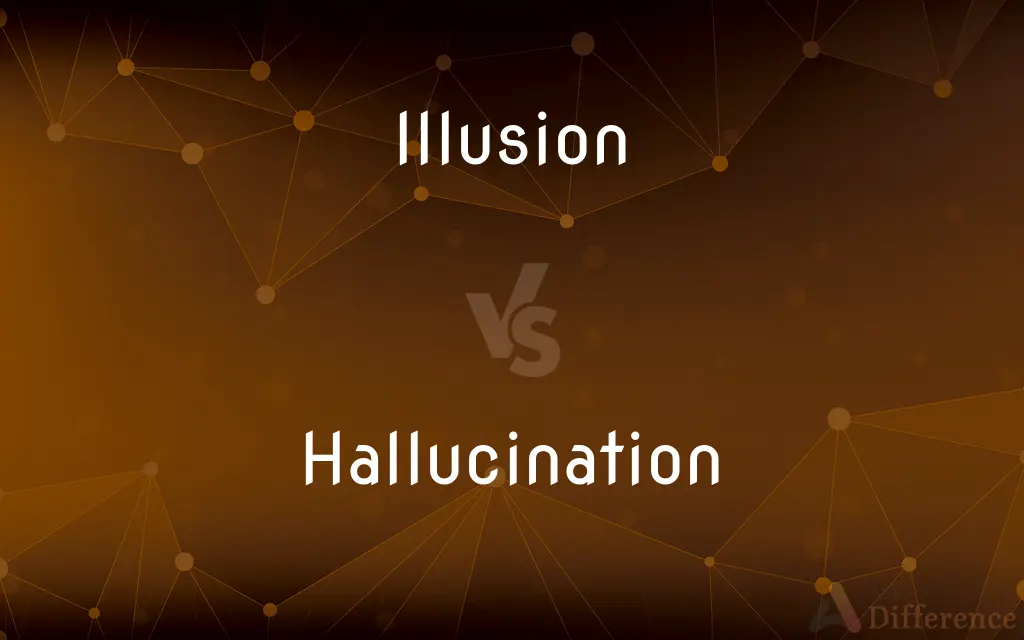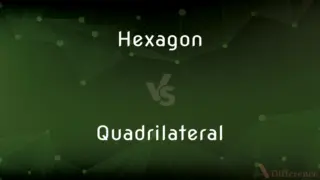Illusion vs. Hallucination — What's the Difference?
Edited by Tayyaba Rehman — By Fiza Rafique — Updated on October 30, 2023
An illusion is a misleading perception or false interpretation of a real sensory experience, while a hallucination is a perception in the absence of an external stimulus.

Difference Between Illusion and Hallucination
Table of Contents
ADVERTISEMENT
Key Differences
Illusions involve distortions of real sensory stimuli, where the mind interprets something differently from how it actually is. Hallucinations, however, involve perceiving something that isn't present at all, with no external stimulus.
An illusion might be seeing an oasis in a desert, which is actually a mirage, while a hallucination could be hearing voices when no one is speaking. Illusions deceive the senses, whereas hallucinations create false sensory experiences.
Optical illusions, such as seeing a stick appear bent in water, are common examples of illusions. Hallucinations are often associated with mental health conditions, like schizophrenia, where someone might see or hear things that don't exist.
Illusions often result from the brain's interpretation of sensory information, relying on existing stimuli. Hallucinations typically stem from neurological or psychological issues, manifesting without external cues.
Comparison Chart
Basis
Distorted interpretation of real stimuli
Perception without external stimuli
ADVERTISEMENT
Example
Mirage in a desert
Hearing voices with no one around
Cause
Sensory deception
Psychological or neurological issues
Commonality
Common in everyday life
Often linked to specific conditions
External Stimulus
Requires a real stimulus
No real stimulus involved
Compare with Definitions
Illusion
A false perception or misinterpretation of a real sensory experience.
The illusion of water on the hot road vanished as they approached.
Hallucination
A perception produced by a mental disorder, without an external stimulus.
His hallucinations included vivid, unsettling visual images.
Illusion
A distortion of the senses, revealing how the brain organizes and interprets sensory stimulation.
The illusion made the straight lines look curved.
Hallucination
A false idea or belief that seems real.
She was plagued by hallucinations that someone was always watching her.
Illusion
A deceptive appearance or impression.
The magician created an illusion of a floating woman.
Hallucination
An experience involving the apparent perception of something not present.
After days without sleep, he began to have hallucinations of shadowy figures.
Illusion
A misleading image presented to the vision.
The optical illusion made the static image appear to move.
Hallucination
A hallucination is a perception in the absence of external stimulus that has qualities of real perceptions. Hallucinations are vivid, substantial, and are perceived to be located in external objective space.
Illusion
An illusion is a distortion of the senses, which can reveal how the human brain normally organizes and interprets sensory stimulation. Although illusions distort our perception of reality, they are generally shared by most people.Illusions may occur with any of the human senses, but visual illusions (optical illusions) are the best-known and understood.
Hallucination
Perception of visual, auditory, tactile, olfactory, or gustatory stimuli in the absence of any external objects or events and with a compelling sense of their reality, resulting from certain mental and physical disorders or as a response to a drug.
Illusion
An erroneous perception of reality
Mirrors gave the illusion of spaciousness.
Hallucination
The objects or events so perceived.
Illusion
An erroneous concept or belief
The notion that money can buy happiness is an illusion.
Hallucination
A false or mistaken idea.
Illusion
The condition of being deceived by a false perception or belief
Spent months flailing about in illusion.
Hallucination
A sensory perception of something that does not exist, often arising from disorder of the nervous system, as in delirium tremens.
Illusion
Something that is erroneously perceived or construed
The animal in the shadows turned out to be an illusion.
Hallucination
The act of hallucinating; a wandering of the mind; an error, mistake or blunder.
Illusion
A fine transparent net fabric, used for dresses or trimmings.
Hallucination
(AI) A confident but incorrect response given by an artificial intelligence.
Illusion
(countable) Anything that seems to be something that it is not.
We saw what looked like a tiger among the trees, but it was an illusion caused by the shadows of the branches.
Using artificial additives, scientists can create the illusion of fruit flavours in food.
Hallucination
The act of hallucinating; a wandering of the mind; error; mistake; a blunder.
This must have been the hallucination of the transcriber.
Illusion
(countable) A misapprehension; a belief in something that is in fact not true.
Jane has this illusion that John is in love with her.
Hallucination
The perception of objects which have no reality, or of sensations which have no corresponding external cause, arising from disorder of the nervous system, as in delirium tremens; delusion.
Hallucinations are always evidence of cerebral derangement and are common phenomena of insanity.
Illusion
(countable) A magician’s trick.
Hallucination
Illusory perception; a common symptom of severe mental disorder
Illusion
(uncountable) The state of being deceived or misled.
Hallucination
A mistaken or unfounded opinion or idea;
He has delusions of competence
His dreams of vast wealth are a hallucination
Illusion
An unreal image presented to the bodily or mental vision; a deceptive appearance; a false show; mockery; hallucination.
To cheat the eye with blear illusions.
Hallucination
An object perceived during a hallucinatory episode;
He refused to believe that the angel was a hallucination
Illusion
Hence: Anything agreeably fascinating and charming; enchantment; witchery; glamour.
Ye soft illusions, dear deceits, arise!
Hallucination
A perception in the absence of external stimulus that has qualities of real perception.
The patient experienced auditory hallucinations, hearing voices no one else could.
Illusion
A sensation originated by some external object, but so modified as in any way to lead to an erroneous perception; as when the rolling of a wagon is mistaken for thunder.
Hallucination
A sensory experience of something that does not exist outside the mind.
The intense fever led to hallucinations of bizarre landscapes.
Illusion
A plain, delicate lace, usually of silk, used for veils, scarfs, dresses, etc.
Illusion
An erroneous mental representation
Illusion
Something many people believe that is false;
They have the illusion that I am very wealthy
Illusion
The act of deluding; deception by creating illusory ideas
Illusion
An illusory feat; considered magical by naive observers
Illusion
An erroneous perception of reality.
In the desert, the travelers were fooled by the illusion of an oasis.
Common Curiosities
What causes an illusion?
Illusions are caused by the brain's misinterpretation of sensory input.
Are illusions considered normal?
Yes, illusions are a normal part of perception and can be experienced by anyone.
Are illusions always visual?
No, illusions can affect other senses too, such as auditory or tactile illusions.
Can illusions be intentional?
Yes, illusions can be intentionally created, as in magic tricks or optical illusions.
Can hallucinations be treated?
Yes, hallucinations can often be treated, depending on their underlying cause.
Do hallucinations have a real basis?
No, hallucinations don’t have a real basis; they occur without an external stimulus.
Are there educational uses for illusions?
Yes, illusions are often used in education to demonstrate how perception works.
Can hallucinations be induced?
Yes, hallucinations can be induced by certain drugs, sleep deprivation, or mental disorders.
Are hallucinations always a sign of mental illness?
Not always; hallucinations can occur due to various reasons, not just mental illness.
Is an illusion a type of hallucination?
No, an illusion is not a type of hallucination; they are distinct phenomena.
Do illusions require consciousness?
Yes, illusions require consciousness as they involve perception.
Can healthy individuals experience hallucinations?
Yes, hallucinations can occur in healthy individuals under certain conditions like sleep deprivation.
Can stress cause hallucinations?
Yes, extreme stress can sometimes lead to hallucinations.
Are illusions and hallucinations studied in psychology?
Yes, both illusions and hallucinations are important subjects of study in psychology.
Can a person recognize their hallucinations as false?
Some people can recognize their hallucinations as false, but others may not.
Share Your Discovery

Previous Comparison
Cay vs. Island
Next Comparison
Hexagon vs. QuadrilateralAuthor Spotlight
Written by
Fiza RafiqueFiza Rafique is a skilled content writer at AskDifference.com, where she meticulously refines and enhances written pieces. Drawing from her vast editorial expertise, Fiza ensures clarity, accuracy, and precision in every article. Passionate about language, she continually seeks to elevate the quality of content for readers worldwide.
Edited by
Tayyaba RehmanTayyaba Rehman is a distinguished writer, currently serving as a primary contributor to askdifference.com. As a researcher in semantics and etymology, Tayyaba's passion for the complexity of languages and their distinctions has found a perfect home on the platform. Tayyaba delves into the intricacies of language, distinguishing between commonly confused words and phrases, thereby providing clarity for readers worldwide.













































